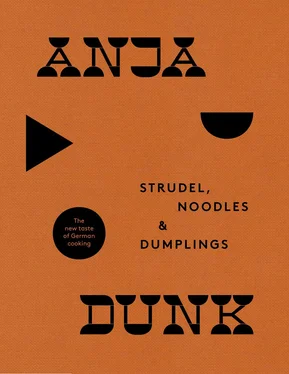THE TASTE OF HOME THE TASTE OF HOME The food you grow up with, the taste of home, stays with you for ever. That doesn’t mean to say it is always a good thing, but happily in my case for the most part it is. Mum did all the cooking at home – she loved it, and so did my brother Oliver and I, not least because Dad’s culinary repertoire consisted solely of cheese sauce over vegetables or Marmite on toast. Mum, on the other hand, is a brilliant cook who values good ingredients and simplicity in the kitchen. By this I mean cooking without pretension, a pared-back approach, I suppose, which in turn means doable cooking. I strive to cook by her ideals, and my hope is that one day my boys will too. Mum left Germany for Africa when she was in her mid-twenties, and Kenya was where she met and married Dad. They lived there until their early thirties, at which point they decided to move to Wales for a life with children. So it was in Wales that my brother and I were born to a German mother and a Welsh father, and it is Wales that I call home, but the food we grew up with is very much rooted miles away in Germany, for it was German food that we ate at our kitchen table every day. I often wonder if what came out of the kitchen during my childhood wasn’t solely to quash the feelings of longing that had taken hold in Mum while living away from her motherland. Taste, after all, is one of the most transportative senses. Feelings of belonging are also heightened when on foreign soil, and so is sense of identity, which in Mum’s case made itself apparent through the German food she produced – consequently, as a child I felt far more German than anything else. The first ten years of my life were pretty nomadic, with time split living between Wales, Africa and Asia – most holidays were spent with our grandparents in Germany. The only constant in daily life, as well as immediate family, was the food that came out of the kitchen. It is little wonder really that cooking has become my chosen career path, as right from the word go it has been one of the most significant elements to each day. Nothing excites me more than delving into another culture by means of cooking, but since having young children of my own, the way I cook at home has shifted back to food that brings me the sense of family, love, security, and confidence – a subconscious impulse to instil the same association between food and home in my children. To me this means food in which Germany is very much at the heart of it all.
INTRODUCTION
SIMPLE COMFORTS
ALL THINGS JARS
FLOUR + WATER = MAGIC
FOOD FOR THE SOUL
NOODLES & DUMPLINGS
QUICK PLATES
GERMAN FLAVOURS
ANYTHING GOES
SOMETHING FOR THE WEEKEND
EVERYDAY BAKES
AT THE END OF A MEAL
BISCUITS & BEYOND
THE FOUR O’CLOCK COCKTAIL
INDEX
ACKNOWLEDGEMENTS
ABOUT THE AUTHOR
ABOUT THE PUBLISHER
The food you grow up with, the taste of home, stays with you for ever. That doesn’t mean to say it is always a good thing, but happily in my case for the most part it is. Mum did all the cooking at home – she loved it, and so did my brother Oliver and I, not least because Dad’s culinary repertoire consisted solely of cheese sauce over vegetables or Marmite on toast. Mum, on the other hand, is a brilliant cook who values good ingredients and simplicity in the kitchen. By this I mean cooking without pretension, a pared-back approach, I suppose, which in turn means doable cooking. I strive to cook by her ideals, and my hope is that one day my boys will too.
Mum left Germany for Africa when she was in her mid-twenties, and Kenya was where she met and married Dad. They lived there until their early thirties, at which point they decided to move to Wales for a life with children. So it was in Wales that my brother and I were born to a German mother and a Welsh father, and it is Wales that I call home, but the food we grew up with is very much rooted miles away in Germany, for it was German food that we ate at our kitchen table every day.
I often wonder if what came out of the kitchen during my childhood wasn’t solely to quash the feelings of longing that had taken hold in Mum while living away from her motherland. Taste, after all, is one of the most transportative senses. Feelings of belonging are also heightened when on foreign soil, and so is sense of identity, which in Mum’s case made itself apparent through the German food she produced – consequently, as a child I felt far more German than anything else.
The first ten years of my life were pretty nomadic, with time split living between Wales, Africa and Asia – most holidays were spent with our grandparents in Germany. The only constant in daily life, as well as immediate family, was the food that came out of the kitchen. It is little wonder really that cooking has become my chosen career path, as right from the word go it has been one of the most significant elements to each day. Nothing excites me more than delving into another culture by means of cooking, but since having young children of my own, the way I cook at home has shifted back to food that brings me the sense of family, love, security, and confidence – a subconscious impulse to instil the same association between food and home in my children. To me this means food in which Germany is very much at the heart of it all.
My maternal grandparents – Omi and Opa – would arrive in Wales from Germany in a car fully laden with salami, pâtés, pickles, bread, biscuits, sweets, jams, meat, sauerkraut, butter – you name it and I’m pretty sure they had it packed in. ‘You’ve brought everything but the cellar steps,’ Mum would screech. ‘We do have food in Wales, you know.’ But despite her seemingly cranky reception, I know that she was just as gleeful as I was to receive these visitors with their gifts.
The contents of this car were the deepest expression of love, and to this day I still vividly remember each time they arrived, for these moments moved me and struck a chord. A well-stocked cellar was to Omi the essence of a home; it stood for security – knowing that no matter what or for whatever occasion there was always food in the house.
Everything in the car was carefully wrapped in newspaper so that it stayed cool, or frozen even in some cases, for the long journey across several countries and over the Channel. We made a human chain and passed the bundles to each other along the driveway to the kitchen table, until the car was empty and we could all finally sit down to eat. Opa would carefully unwrap the rye bread and slice it thinly, Omi would spread the sweet unsalted butter, then we would all help ourselves to pâté and mustard, possibly gherkins. That first bite into the dense, nutty bread tasted of home, said Omi, which when all is said and done is all that you wish to feel when you have been on the road for two days and travelled hundreds of miles.
It isn’t what we ate each year on their arrival that I recall, so much as the feeling of affection expressed through the journey this food had travelled. It goes without saying that eating is a human necessity, but cooking, and consequently the act of giving and sharing food, is a wholly gratifying experience both for the cook and the recipient, and it is one of the most natural things we can do to show each other how we feel.
Food and cooking are at the centre of our kitchen table but in actual fact they are only part of the bigger picture, which is the importance of everyone crowding around together and chatting – sharing snippets from events of the day. Of course sometimes reality doesn’t allow the calm eating experience I hope for, but it doesn’t stop me aiming for it each night. The scene in our house is usually far from perfect. There are daily squabbles, and generally it’s messy, but family table time is full of laughter and fun too, and I love it, chaos and all.
Читать дальше












